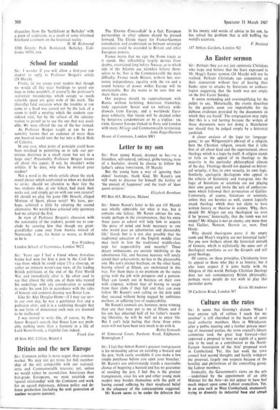Sir: Years ago I had a friend whose first-class brains
had won for him a post in the Civil Ser- vice from which he could enjoy (?) a close-up, or rather an intimate worm's-eye view, of the leading British politicians at the end of the First World War and immediately after it. He often used to say that almost the only one of them who treated his underlings with any consideration or seemed to order his own life in accordance with the rules of honour and common decency was Bonar Law.
Like Sir Alec Douglas-Home—if I may say so— in our own day, he was a gentleman first and a politician after, and it is a saddening thought that in our form of democracy such men are doomed to be ineffectual.
I was moved to write this, of course, by Pro- fessor Brogan's remark that Bonar Law was prob- ably nothing more than a footnote in a life of Lord Beaverbrook, a frightful fate indeed.






























 Previous page
Previous page